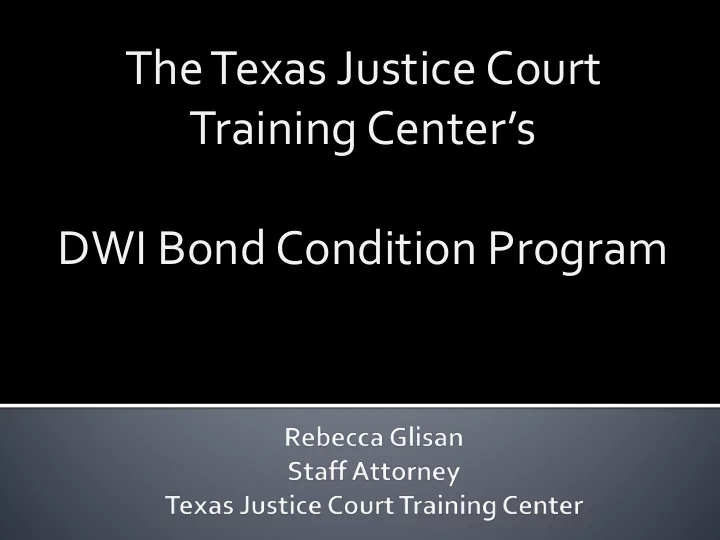

The Texas Justice Court Training Center’s DWI Bond Condition Program
To improve the consistency and efficacy of bond conditions in DWI cases – and thus improve public safety To improve communication between magistrates, judges, probation, prosecutors, etc. concerning bond conditions in DWI cases
Why are bond conditions so important in DWI cases?
Time between arrest and trial can be long Delays in getting drug test results back have led to even longer delays in getting to trial Bond conditions are critical in protecting public safety during that interim
A magistrate “may impose any reasonable condition of bond related to the safety of a victim of the alleged offense or to the safety of the community.” --Art. 17.40 Ex: counseling/treatment; Home curfew; Alcohol/controlled substance testing; Mandatory v. Permissive Interlock --Art. 17.441
NHTSA: “Research shows that ignition interlocks are associated with substantial reductions in recidivism, ranging from 50 percent to 90 percent while the interlock is installed on the vehicle.” “Research studies demonstrate that ignition interlocks are effective for both first-time and repeat DWI offenders. --Voas & Marques, 2003; Willis et al., 2005; Vezina, 2002; Tippetts & Voas, 1997; Coben & Larkin, 1999.
Interlocks are the most effective DWI sanction. 99.993% of Interlocked Days are No-DWI days. Interlocks are the most overall cost-effective sanction. The cost is about $2.50/day, paid by the offender. Interlocks are perceived as fair by 85% of offenders. 70% less recidivism than license revocation Interlocks supply 24/7 supervision.
Two major studies concluded that requiring all drivers convicted of DWI to install ignition interlock devices results in a significant reduction in the rate of alcohol- related crash deaths. The benefits of this policy are comparable to the implementation of airbags and the minimum legal drinking age The studies are based on an analysis of the impact of ignition interlock laws in all 50 states over the last 32 years. https://ajph.aphapublications.org/doi/abs/10.2105/AJPH.2016.303058 http://www.ajpmonline.org/article/S0749-3797(16)30587-6/abstract
If there is an ALR hearing, officer might not attend and suspension could go away Even if a license suspension remains in place: The person may be able to obtain an ODL Even if they don’t get an ODL, statistics show that up to 75% of drivers will continue to drive on a suspended license.
The magistrate may designate an appropriate agency to verify the installation of the device and to monitor the device. -- Art. 17.441(d), Code of Criminal Procedure In order to be effective bond conditions set by a magistrate must be monitored
Responsibility for monitoring or altering bond conditions shifts from the magistrate to the trial court judge when a complaint/information/indictment is filed. Good communication helps everyone know who has jurisdiction. Some counties use regularly updated online databases that are easy to check; but not all counties have this resource
Important for magistrates and trial court judges to be on the same page Frequent changes to bond conditions result in an uncertain and unpredictable system for defendants, prosecutors, and court staff Bond conditions are perceived as fair when there is some consistency in the bond conditions set by various county magistrates, and those conditions are monitored/enforced consistently and fairly
Example: CSCD is appointed as the monitoring agency They receive reports from the Interlock provider If they notice a problem whom do they notify? The magistrate? Or the trial court?
Example: Justice of the Peace held bond modification hearing Modified the bond conditions (GPS device) It turned out the defendant had been indicted But indictment was under seal District Judge filed a Judicial Conduct Commission Complaint
Under this program, the county adopts a comprehensive plan for setting, monitoring, and enforcing bond conditions in DWI cases. The program is funded by a traffic safety grant from the Texas Department of Transportation and administered by the Texas Justice Court Training Center. Free for the county!
Goal of the program is to get all county officials on the same page concerning: Mandatory bond conditions Permissive bond conditions Monitoring & enforcement of bond conditions Communication concerning jurisdiction
For further information contact: Randall L. Sarosdy Rebecca J. Glisan Texas Justice Court Training Center rsarosdy@txstate.edu rebecca.Glisan@txstate.edu 512-347-9927, ext. 201 or ext. 211
Recommend
More recommend